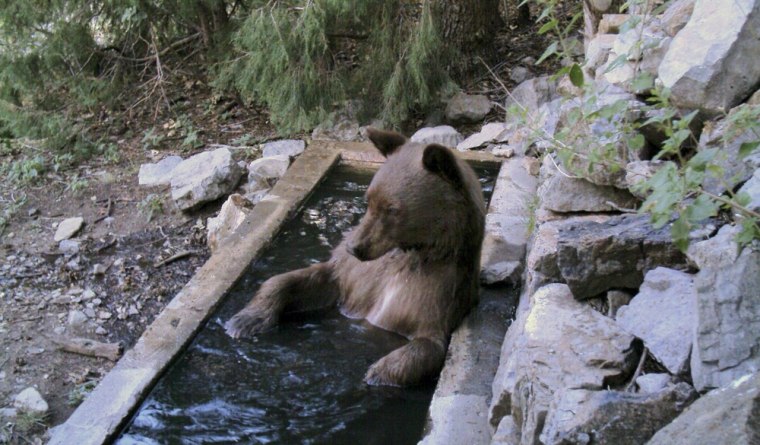A severe drought is driving normally reclusive bears into urban areas of Texas and other parts of the West in search of food and water in gardens, dumpsters and even bird feeders.
With fires scorching black bear ranges in the mountains of West Texas and the drought making it difficult to find water and food, the feared animals have been making their way increasingly into towns and cities.
"They're going to where they need to," said Louis Harveson, professor of wildlife management at Sul Ross State University. "They're scavengers — they're basically an oversized raccoon."
When West Texas resident Penny Ferguson recently returned from an early morning workout, her beagle began barking wildly, and Ferguson ran outside to keep it from waking the neighbors.
A full-grown black bear on all fours, so big its shoulders reached her hips, was on her front lawn near the bird feeder. The bear ran out from under Ferguson's front window and casually loped across the street.
"It wasn't much bothered, but didn't like the noise," said Ferguson, of Fort Davis, which is near the Davis mountains southeast of El Paso. "We're in town, much further into town than I would ever expect bears to be coming."
There have been 13 black bear sightings in West Texas since May 31, compared to only one in all of 2010, according to Jonah Evans, a Texas Parks and Wildlife diversity biologist for the Trans-Pecos region in charge of tracking bear sightings.
New Mexico's drought has also impacted bears and other wildlife there, and last month in Arizona, a 61-year-old woman was killed by a bear digging through a dumpster as she walked her dog at a country club in Pinetop, 200 miles from Phoenix.
In the Big Bend area of Texas, black bears were once numerous before hunting almost lead to their extinction. But they have been making a comeback in the last few decades.
"We used to have thousands of bears in the state of Texas," Harveson said. "They (hunters) used to hunt in the Davis Mountains and harvest eight a day."
In the late 1980s, a female bear made her way across the Rio Grande from Mexico, found a male and created the first mating pair in the state in decades.
Since then, the bear population in Texas has fluctuated. Now, Harveson said, that population might see a permanent jump, an unexpected benefit to the devastation of the drought.
"I think that whole drought-lack-of-food-availability cycle actually helps them recolonize new habitats," Harveson said.
"Because they're able to put their nose in the air and smell water, and once they get to the river, they start exploring. That's what we're seeing in the Big Bend."
